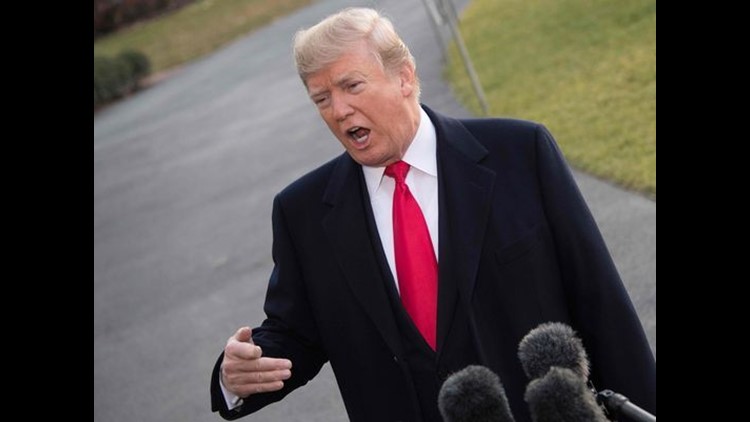WASHINGTON – President Trump may pay a big political price for his investment in Roy Moore.
As Doug Jones claims an Alabama Senate seat – a Democratic win in the reddest of red Republican states – Trump's critics plan to hang his support of Moore around his neck for months and maybe years to come.
Trump's support for a controversial candidate accused of serial sexual assault and harassment of young girls, analysts say, may haunt the president as he and the GOP pursue a conservative agenda and try to keep control of Congress in next year's national elections.
Not only do the Republican lose an important vote in a closely divided Senate as they struggle to pass key priorities such as health care reform, tax cuts, and infrastructure – but Moore's defeat may reduce Trump's political influence headed into a challenging election season.
"This is the first real evidence that a political backlash might be brewing to Trump-ian Republican politics," said Julian Zelizer, a history and public affairs professor at Princeton University.
More: Analysis: Jones victory a boost for Democrats — and some Republicans
More: Democrat Doug Jones wins stunning upset over Roy Moore in Alabama Senate race
More: Sharia law, slavery and abolishing amendments: 6 of Roy Moore's most memorable quotes
Trump, meanwhile, appeared to distance himself from Moore on Wednesday. "If last night’s election proved anything, it proved that we need to put up GREAT Republican candidates to increase the razor thin margins in both the House and Senate," he said in a tweet.
Moore stands accused of inappropriate sexual advances and sexually assaulting girls as young as 14 when he was in his 30s and working as a county prosecutor.
While Trump said little about Moore after the sexual allegations surfaced, he later gave a full-throated endorsement, citing his denials and stressing the need to keep the Alabama Senate seat in Republican hands. He taped a robocall in support of Moore and held a rally across the border in northwestern Florida, describing Jones as a "puppet" for liberal Democratic leaders Chuck Schumer and Nancy Pelosi.
Now Trump, who initially backed Luther Strange to fill the seat left open after Jeff Sessions was appointed attorney general, is 0 for 2 in his picks for the Alabama seat. And Republican defeats in governor's races in Virginia and New Jersey last month also featured troubling signs for Trump and his party.
Even so, Trump sought to characterize the election as a one-off, and defended his own influence in the race. "The reason I originally endorsed Luther Strange (and his numbers went up mightily), is that I said Roy Moore will not be able to win the General Election," Trump tweeted. "I was right! Roy worked hard but the deck was stacked against him!"
Yet critics say there's no un-ringing the bell when it comes to Trump's support for the problematic candidate. Even as Republican lawmakers maintained their calls for Moore to exit the race, the Republican National Committee also backed the Alabama candidate once Trump did, reversing its decision to withdraw after the allegations surfaced.
Now, after Jones's win, some Democrats served notice they will continue to link Trump to Moore ahead of next year's elections – and even pursue harder the sexual misconduct allegations that have been made against the president.
Rep. Maxine Waters, D-Calif., who has called for the president to be impeached or resign, tweeted after Tuesday's results: "How many diet cokes did Trump consume while he gulped and waited for the defeat of his pedophile candidate??"
Neera Tanden, president of the liberal Center for American Progress, said Jones' victory "shows that even in deep red Alabama, Americans across the country are rejecting Trump’s agenda, including his attacks on women, reproductive rights, immigrants, and the LGBT community."
In the wake of sexual harassment claims against a number of powerful men, from film mogul Harvey Weinstein to members of Congress, women who accused Trump of improper behavior prior to the 2016 election are now calling for congressional hearings on their allegations.
As lawmakers such as Sen. Al Franken, D-Minn., and Rep. Trent Franks, R-Ariz., resign after harassment allegations, some Democrats lawmakers are calling on Trump himself to step down over allegations of his own improper sexual behavior.
"As we just saw in Alabama, women are not going to be silenced ... I think what people do want is accountability and he (Trump) should resign,” Sen. Kirsten Gillibrand, D-N.Y., whom Trump attacked personally in a suggestive and provocative Tuesday tweet, told NBC's Today show after Jones' election.
Trump has denied the women's accusations, calling them politically motivated.
Seeking to put the Alabama race behind him, Trump on Wednesday aims to turn back to his policy agenda Wednesday with an emphasis on a pending tax bill. He met with lawmakers who are negotiating the final details of the tax plan on Wednesday, but talk about Moore still made headlines.
Trump acknowledged that while some Republicans objected to the candidate, "I would have liked to have had the seat." Trump, who will give a speech on taxes on Wednesday, also called for a final vote on the tax bill as soon as possible – in other words, before Moore takes office.
Like Trump, Senate Republicans are pushing for a tax cut vote in the coming days before Jones can take his seat.
When the Alabama Democrat does join the Senate, however, Trump and the Republicans will have just a 51 vote majority – and even less margin for error as they continue to pursue a plan to repeal and replace former President Obama's health care law.
Trump is also expected to introduce an infrastructure plan as part of his 2018 legislative program, which will take place in the shadow of the November congressional elections.
Republican party in-fighting is another challenge for Trump's White House.
Steve Bannon, the former Trump adviser who backed Moore so vocally in the Alabama, has said he may support primary challengers to members of the Republican establishment. GOP primaries could generate very conservative candidates who, like Moore, may have trouble in a general election.
Steven Law, president of the Senate Leadership Fund, put the blame for Tuesday's race squarely on Bannon. "Not only did Steve Bannon cost us a critical Senate seat in one of the most Republican states in the country," he said. "but he also dragged the president of the United States into this fiasco."
In the meantime, Trump faces what Zelizer called "an increasingly unhappy Republican party who sees the cost they are starting to pay for his presidency and that his support doesn’t carry great weight even in the Deep South."
Others cautioned: No so fast. It was just one race in a unique set of circumstances, they say.
Urging people not to get ahead of themselves, Republican strategist Mike DuHaime said on Twitter: "Moore was the single worst possible caricature of an awful candidate in the history of ever. Lost by 1."
Trump has only confidence about Republican political prospects in 2018 and his own chances for re-election in 2020, citing the rise of the stock market and the economy in general.
In congratulating Jones via tweet late Tuesday night, Trump also referred to the fact that there will be another election for the seat in 2020.
"Write-in votes played a very big factor, but a win is a win," Trump said. "The people of Alabama are great, and the Republicans will have another shot at this seat in a very short period of time. It never ends!"



